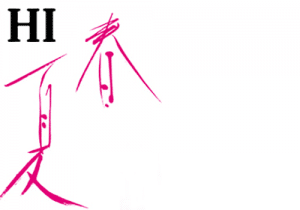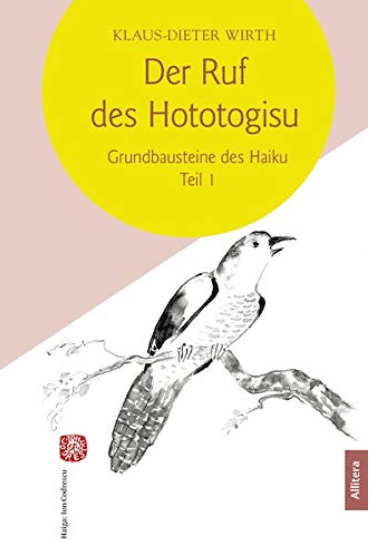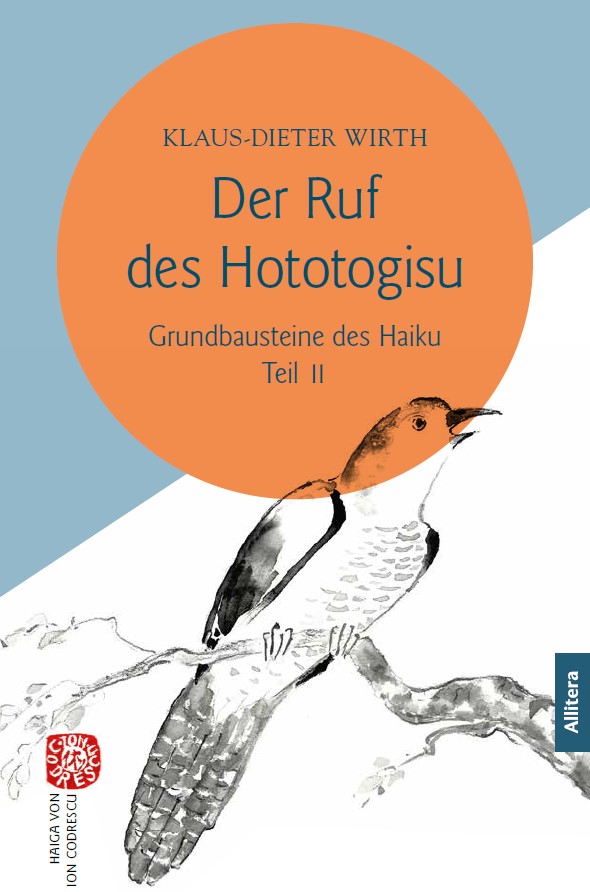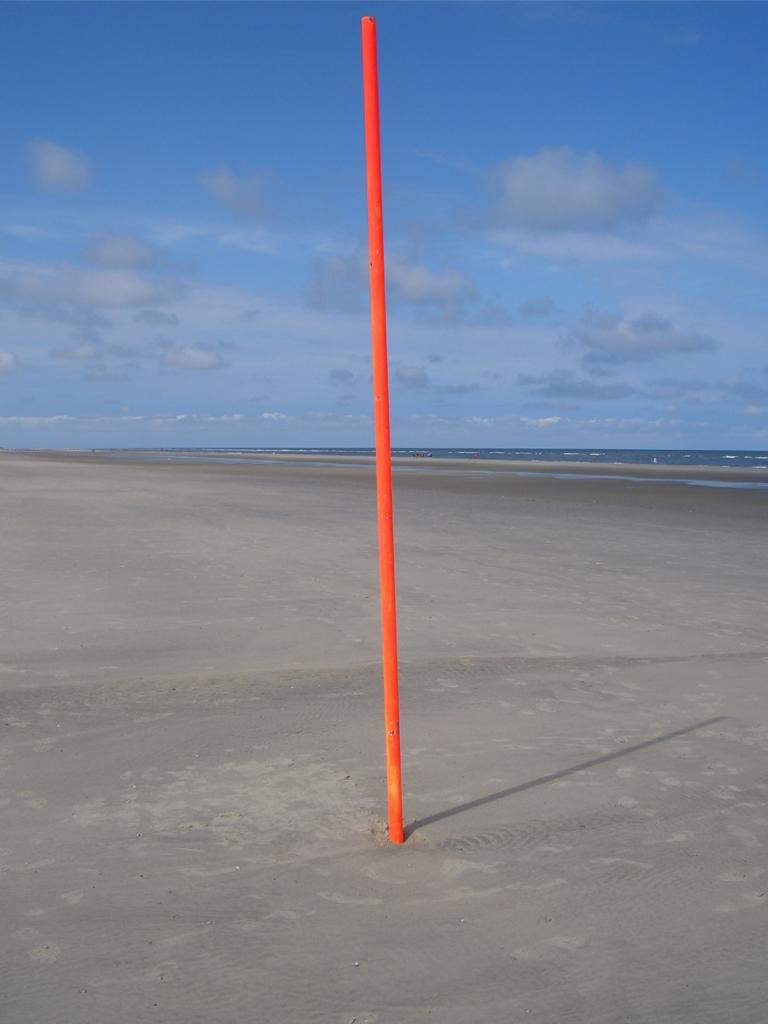Es wurden insgesamt 222 Haiku von 80 Autorinnen/Autoren und 58 Tanka von 25 Autorinnen/Autoren für diese Auswahl eingereicht. Einsendeschluss war der 15. April 2023. Diese Texte wurden vor Beginn der Auswahl von mir anonymisiert.
Jedes Mitglied der DHG hat die Möglichkeit, eine Einsendung zu benennen, die bei Nichtberücksichtigung durch die Jury auf einer eigenen Mitgliederseite veröffentlicht werden soll.
Eingereicht werden können nur bisher unveröffentlichte Texte (gilt auch für Veröffentlichungen in Blogs, Foren, inklusive die Foren auf HALLO HAIKU, sozialen Medien und Werkstätten etc.).
Bitte keine Simultan-Einsendungen!
Bitte alle Haiku/Tanka unbedingt gesammelt in einem Vorgang in das Online-Formular auf der DHG-Webseite HALLO HAIKU selbst eintragen:
Ansonsten per Mail an: auswahlen@sommergras.de
Der nächste Einsendeschluss für die Haiku-/Tanka-Auswahl ist der 15. Juli 2023.
Jeder Teilnehmer kann bis zu sechs Texte – drei Haiku und drei Tanka – einreichen.
Mit der Einsendung gibt der Autor/die Autorin das Einverständnis für eine mögliche Veröffentlichung in der Agenda der DHG und auf http://www.zugetextet.com/sowie für eine mögliche Vorstellung auf der Website der Haiku International Association.
Haiku-Auswahl der HTA
Die Jury bestand aus Ruth Karoline Mieger, Sonja Raab und Wolfgang Gründer. Die Mitglieder der Auswahlgruppe reichten keine eigenen Texte ein.
Alle ausgewählten Texte – 22 Haiku von 18 Autoren und Autorinnen – werden in alphabetischer Reihenfolge der Autorennamen veröffentlicht. Es werden max. zwei Haiku pro Autorin/Autor aufgenommen.
„Ein Haiku, das mich besonders anspricht“ – unter diesem Motto besteht für jedes Jurymitglied die Möglichkeit, bis zu drei Texte auszusuchen (noch anonymisiert), hier vorzustellen und zu kommentieren. Diesmal wurden 3 Texte ausgewählt.
Da die Jury sich aus wechselnden Teilnehmern zusammensetzen soll, möchte ich an dieser Stelle ganz herzlich alle interessierten DHG-Mitglie-der einladen, bei kommenden Auswahl-Runden als Jurymitglied mitzu-wirken.
Peter Rudolf
Ein Haiku, das mich besonders anspricht
Ein Vogelhäuschen
ziert ihren neuen Balkon
kommt ja sonst niemandEva Beylich
In den ersten beiden Zeilen kommt dieses Haiku ganz unscheinbar daher, und vielleicht übergeht man es nach einem kurzen ersten Blick sogar. Der Vorwurf in der letzten Zeile öffnet allerdings eine ganze Welt. Liest man es dann langsamer noch einmal, entdeckt man das Wort „neuen“ in der zweiten Zeile. Da hat also jemand einen neuen Balkon bekommen, oder ist sogar umgezogen!
Meine Gedanken springen unweigerlich zu einem Seniorenheim oder Pflegeheim und ich sehe eine verbitterte Bewohnerin, deren Familie sich viel zu selten blicken lässt. Sie sieht den Rotkehlchen und Meisen zu, wie sie aus dem neuen Vogelhäuschen die Körner aufpicken. Ob das neue Treiben vor ihrer Balkontür ihr Herz erreicht, ist fraglich. Vielleicht lässt sich eine Weile zumindest vergessen, was im Leben geschieht. Vielleicht bringen die kleinen Vögelchen mit ihrem Gehüpfe und Gezwitscher tatsächlich eine kurzweilige Ablenkung und erfreuen die Bewohnerin. Doch dann werden ihre Gedanken wieder abschweifen, und sie würde sich wünschen, das lustige, bunte, fröhliche Treiben würde auch in ihren Räumlichkeiten stattfinden und nicht nur am Vogelhäuschen.
Ausgesucht und kommentiert von Sonja Raab
Abgelegenes Ufer.
Im verrottenden Boot
blühen GräserReinhard Dellbrügge
Mich erinnert dieses Haiku an die Aussage eines Psychologen, der einmal sagte, einzelne Menschen seien wie Inseln. Er ging davon aus, dass jede Menschen-Insel ihre eigenen Ansichten, Krankheiten, Ideen, Erlebnisse, Erfahrungen und Grenzen trage. Wenn zwei Inseln, also zwei Menschen, sich begegnen, dann können sie gemeinsame Interessen entdecken, gemeinsame Erfahrungen austauschen, Ideen entwickeln, und so würden sich zwei kleine Inseln zu einer größeren verbinden. Die Inseln überschneiden sich dann an manchen Stellen und wachsen gemeinsam. Es gibt an jedem Menschen, der einem im Leben begegnet, Stellen, an denen die eigene Insel andocken kann. Das birgt die Möglichkeit, Gemeinsamkeiten zu finden, sich weiterzuentwickeln, auf andere Ideen zu kommen, gemeinsam Größeres zu erschaffen.
Als ich die erste Zeile dieses Haikus las, war ich gedanklich weit weg von anderen Menschen. Man sucht die abgelegenen Plätze auf, um alleine zu sein. Man steht am Wasser, lässt vielleicht die Gedanken treiben. In der zweiten Zeile kommt ein Boot ins Blickfeld. In einem Boot haben vielleicht mehrere Menschen Platz. Aber das Boot ist bereits am Verrotten. Es trägt nicht mehr. Morsches Holz, alles kaputt. Zu nichts mehr nutze. Und ich bin noch am Überlegen, wen ich in mein Boot an diesem abgelegenen Ufer einladen würde, als schon die dritte Zeile daherkommt: Da blühen Gräser. Neues Leben erwacht. Alles hat seinen Sinn, auch das Verrottende trägt dazu bei, es entsteht immerhin so viel Kraft, dass daraus etwas erblüht.
Unweigerlich sehe ich plötzlich eine sterbende Beziehung vor mir. Die Partner haben sich vielleicht auf ihr Ufer zurückgezogen. Da sind nur noch abgelegene Ufer. Das Boot könnte symbolisch für das stehen, was gemeinsam getragen hat: die Ehe, die Beziehung, die Liebe. Verrottet ist aber nur ein Teil einer Entwicklung. Immer noch ist da die Kraft, dass etwas daraus wachsen und erblühen kann. Das gibt Hoffnung, und vielleicht ist das blühende Gras als Symbol genau die Schnittstelle zwischen zwei Inseln, die sich nun wieder verbinden können und sich eventuell verzweifelt an diese zarten Grashalme klammern. Wenn ich das Haiku nun aus der Sicht eines getrennten Paares lesen würde, wäre da in der letzten Zeile plötzlich Hoffnung.
Ausgesucht und kommentiert von Sonja Raab
In samtigem Blau
zieht sie ihre Bahn –
Venus am AbendBirgit Wendling
Das samtige Blau umspielt in der ersten Zeile sofort die Haut und fühlt sich gut an. Behaglich, weich, angenehm. Man schwimmt darin, fühlt sich geborgen. Das Blau wirkt beruhigend, entspannend. Die zweite Zeile bestätigt dieses Gefühl auch noch, es ist also eine „sie“, die darin schwimmt, ihre Bahnen zieht, das Blau des Wassers in einem Schwimmbecken zerteilt? Erst die dritte Zeile lenkt vom Wasser in den Himmel, verbindet die Erde mit dem Himmel, die Frau wird zur Venus. Ein wunderschöner Moment, dieses Wechselspiel der Bilder, die da im Kopf entstehen. Meiner Meinung nach ein sehr gelungenes Haiku!
Ausgesucht und kommentiert von Sonja Raab
Die Auswahl
Kindheitsfotos
von verblassten Sommern
bleibt ein LächelnMarcus Blunck
im Feuerschein
die tanzende Braut
mit ernster MieneHorst-Oliver Buchholz
Abgelegenes Ufer.
Im verrottenden Boot
blühen Gräser.Reinhard Dellbrügge
Wiedergefunden
die alte Tanzkarte
meiner OmaHildegard Dohrendorf
Frühlingsregen
fröhlich quietschen
meine SchuheDieter Gebell
vertraute Stimmen
ich schließe
das TagebuchGabriele Hartmann
aussprache
in jedem wort
schweigenMichaela Kiock
wetterwechsel
der mairegen
in ihrer stimmeMichaela Kiock
In der Kapelle
beim Frühjahrsputz den Staub von
den Bänken wischen.Moritz Wulf Lange
Autoroute du Soleil –
auf meiner Playlist
die Lieder von damalsEva Limbach
Sommersonnwende
die ungelesenen Bücher
neu sortiertEva Limbach
vor der hüft-op
mutter und ich schauen
let’s danceRobert P. Martin
grauer Morgen
zwischen müden Gesichtern
ein KinderliedIngrid Meinerts
Familienfeier
sie deckt einen Teller mehr
vielleicht …Eleonore Nickolay
Polarlichter
sie halten inne
in ihrem StreitEleonore Nickolay
zurück aus der Heimat
meine Klamotten riechen
nach KindheitKamil Plich
der lange Weg ans Ziel
ein Taxifahrer
kommentiert die WeltlageWolfgang Rödig
fassadenlächeln …
auf dem empfangstresen
welkende tulpenBirgit Schaldach-Helmlechner
abnehmender Mond
wieder ist er negativ
der SchwangerschaftstestMarie-Luise Schulze Frenking
sein Wort
ein Steinwurf ins Wasser
WellenringeAngelica Seithe
am Fenster
die Reihe der Kraniche
gefaltetFriedrich Winzer
Sommermode
das Lächeln der Models
eingefrorenFriedrich Winzer
Tanka-Auswahl der HTA
Silvia Kempen und Martin Thomas wählten 4 Tanka von 4 Autoren und Autorinnen aus.
„Ein Tanka, das mich besonders anspricht“ – hier wird diesmal ein Tanka vorgestellt und kommentiert.
Ein Tanka, das mich besonders anspricht
Sommerabend
ihr Kopf an meiner Schulter
wortlos
versinken wir träumend
ins Leuchten der StilleFriedrich Winzer
Manchmal ist es schon erstaunlich, welch große Assoziationskräfte kurze Gedichte wie das Tanka in uns freisetzen. So schreibe ich diese Zeilen in der Realität zwar in meiner kleinen Kölner Wohnung an einem verregneten Morgen im April, sitze in Gedanken jedoch an einem lauen Abend Ende Juni auf einer Bank einer Uferpromenade einer südeuropäischen Stadt am Mittelmeer – so zumindest das Bild, welches beim Lesen des ausgewählten Tanka in meinem Kopf entsteht. Vom Wasser her weht eine sanfte Brise, die Luft riecht ein wenig salzig, und neben mir befindet sich eine mir wichtige Person, den Kopf an meine Schulter gelehnt. Der geschäftige Trubel des Tages ist vorüber, nur ab und an zieht ein flanierendes Pärchen an uns vorbei, begleitet vom monotonen Rauschen der in regelmäßigen Abständen ans Ufer schlagenden Wellen. Wie hypnotisiert lassen ich und meine Begleitung den Blick in die Ferne schweifen, der nur hier und da das abendliche Funkeln einer sich an die Küste schmiegenden Ortschaft wahrnimmt.
Womöglich haben Sie, liebe Leserinnen und Leser, an etwas vollkommen anderes gedacht, als Sie das ausgewählte Tanka zum ersten Mal lasen. Vielleicht befanden Sie sich auf einem Berg im Allgäu und haben nach einer lebhaften Wanderung der Sonne beim Untergehen zugeschaut. Vielleicht machten Sie es sich aber auch auf der Hollywoodschaukel ihres Schrebergartens bequem und haben den Tag gemütlich bei einem Glas Wein ausklingen lassen. Die möglichen Szenarien, die mit diesem Tanka verbunden werden können, scheinen schier unendlich zu sein. Eines haben diese jedoch alle gemein: ihre Atmosphäre. So hat mich das Gedicht vor allem angesprochen, da es ihm gelingt, eine ganz besondere Stimmung einzufangen, die mit positiven Gedanken und einem warmen Gefühl in der Brust verbunden ist. Dabei entsteht diese Stimmung nicht allein aufgrund des Motivs des Sommerabends, sondern insbesondere durch die Verknüpfung desselben mit den anderen Details wie dem wortlosen Beieinandersitzen und dem gemeinsamen Vorsichhinträumen.
Neben der geschaffenen Atmosphäre, in die sich je nach Betrachtung durchaus auch eine gewisse Schwermut und Melancholie mischen können, lebt das Tanka vor allem von seiner gelungenen Balance zwischen Konkretheit und Abstraktheit. So ist es nicht nur die räumliche Umgebung, die im Vagen bleibt, sondern beispielsweise auch das Verhältnis zur Person, die neben dem lyrischen Ich sitzt. Es könnte die innig geliebte Partnerin sein, genauso wie eine gute Freundin oder die alternde Mutter. Ebenso offen ist die Frage, wovon da genau geträumt wird. Handelt es sich nur um ein zielloses Dahinfließen der Gedanken, malt man sich gerade die eigene Zukunft aus, oder sind es Erinnerungen an die Vergangenheit, die einem durch den Kopf gehen? Das ausgewählte Tanka spart diese Details der im Hintergrund verborgenen Geschichte genau im richtigen Maß aus, sodass jede Leserin und jeder Leser ihren oder seinen ganz persönlichen Zugang zu ihm finden dürfte. Somit ist es die aus dem klassischen Waka bekannte Universalität des menschlichen Empfindens, die hier wirkt.
Dass die beiden Bilder, aus denen sich das Gedicht zusammensetzt – das gemeinsame Verbringen eines Sommerabends und das verträumte Lauschen der Stille –, sehr nahe beieinanderliegen, empfinde ich persönlich nicht als Makel. Ganz im Gegenteil, diese Nähe ist Voraussetzung dafür, dass sich die Botschaft des Gedichts, die im Aufruf zum sinnlichen Genuss eines jeden Lebensmomentes liegt, voll entfalten kann. Überdies scheint diese Nähe mit Blick auf die sprachliche Ebene auch bewusst gewählt zu sein. So bildet das einzeln stehende „wortlos“ im dritten Vers als Scharnier sowohl das Ende des ersten Bildes („ihr Kopf an meiner Schulter / wortlos“) als auch den Anfang des zweiten Bildes („wortlos / versinken wir träumend“), die so fließend ineinander übergehen. Ferner wird dieses „wortlos“ im letzten Vers durch das „Leuchten der Stille“ nochmals gekonnt aufgegriffen, wobei die Leserschaft hier erfährt, dass es sich bei dem thematisierten Schweigen zwischen den beiden Personen nicht um einen Ausdruck der Distanz, sondern um einen Ausdruck der Verbundenheit im gemeinsamen Erleben eines Augenblicks handelt. Dies geht implizit auch aus dem an die Schulter angelehnten Kopf des zweiten Verses hervor, der Nähe symbolisiert.
Alles in allem handelt es sich beim vorliegenden Tanka um ein Gedicht, das die Stimmung eines Moments in ausgesprochen gelungener Weise festhält. Ein Lobgesang auf das Leben und das Träumen.
Ausgesucht und kommentiert von Martin Thomas
Die Auswahl
ein Pfeil aus Licht
trifft auf die Netzhaut
flimmert
den Sehnerv entlang
ins Gehirn: Oh!-rionFrank Dietrich
gestern war ich dort
wo wir uns immer trafen
die Sonne schien und
ich spürte den Wind auf der Haut
sonst nichts – ich blieb alleinBrigitte ten Brink
Einhirn sucht Neunhirn:
tief abgetaucht zu einem
Octopusweibchen
bin ich gefesselt von ihr
der BefreiungskünstlerinDagmar Westphal
Sommerabend
ihr Kopf an meiner Schulter
wortlos
versinken wir träumend
ins Leuchten der StilleFriedrich Winzer
Sonderbeitrag von Brigitte ten Brink
Neu schreibt Brigitte ten Brink, ehemaliges Mitglied des Vorstandes, einen Sonderbeitrag im Wechsel mit René Possél. Herzlich willkommen, liebe Brigitte, in dieser Rubrik.
Autoroute du Soleil –
auf meiner Playlist
die Lieder von damalsEva Limbach
Dieses Haiku handelt von einer Fahrt auf der Autoroute du Soleil, der französischen Autobahn A 7, welche die beiden, nach Paris größten Städte Frankreichs, Lyon (die drittgrößte Stadt) und Marseille (die zweitgrößte Stadt des Landes) miteinander verbindet. Gut 300 km geht es auf der „Sonnenstraße“ durch Frankreich, von den Rhone-Alpen bis zur Côte d’Azur.
Sonne, in der ersten Zeile, und Musik, in den beiden folgenden, sind die wesentlichen Bestandteile dieses Haiku und verleihen ihm im ersten Moment des Lesens eine Beschwingtheit. Doch diese Beschwingtheit wird durch das letzte Wort des Haiku relativiert. Der zentrale Begriff, um den es hier geht, ist „damals“. Es sind nicht irgendwelche Lieder auf der Playlist gespeichert, sondern die Lieder von „damals“, als diese Strecke schon einmal zurückgelegt wurde. Dieses „damals“ hat also auch heute noch Bedeutung, und als Leserin drängt sich mir der Gedanke auf, wie war es „damals“, und ich fange an, mir die Geschichte vorzustellen: Man war jung, die Welt stand offen, und es war Urlaubszeit, Ferienzeit und unbeschwerte Tage standen bevor. Und heute? Wieder ist Urlaubszeit. Auch wenn der gleiche Weg wie „damals“ genommen wird, die Zeit lässt sich nicht zurückdrehen. Doch sie lässt sich noch einmal erinnern, und das auch bewusst. Davon zeugt die eigens für diese Fahrt zusammengestellte Playlist. Wabi sabi – u. a. die Schönheit des Vergänglichen – wird hier auf eine ganz eigene Art thematisiert. Die Flüchtigkeit gerade auch von schönen Ereignissen wird in diesem Haiku zum Thema gemacht. Diese Erlebnisse können nicht in die Realität zurückgeholt werden. Sie gehören jedoch zu dem „einzige(n) Paradies, aus dem niemand vertrieben werden kann“*.
Diese subtile Wehmut ist neben der Leichtigkeit des Seins auf der Fahrt in die Ferien, in meiner Lesart, der hauptsächliche Aspekt dieses Haiku. Etwas ist vorbei, doch nicht vergessen, im Gegenteil, es ist nach wie vor lebendig, wenn auch nur in der Erinnerung. Doch diese Erinnerung stimmt nicht wirklich traurig, sie ist Teil des Lebens geworden.
*Zitat von Jean Paul: „Die Erinnerung ist das einzige Paradies, aus dem man nicht vertrieben werden kann.“ aus: Zitate und Aphorismen – Gute Zitate







